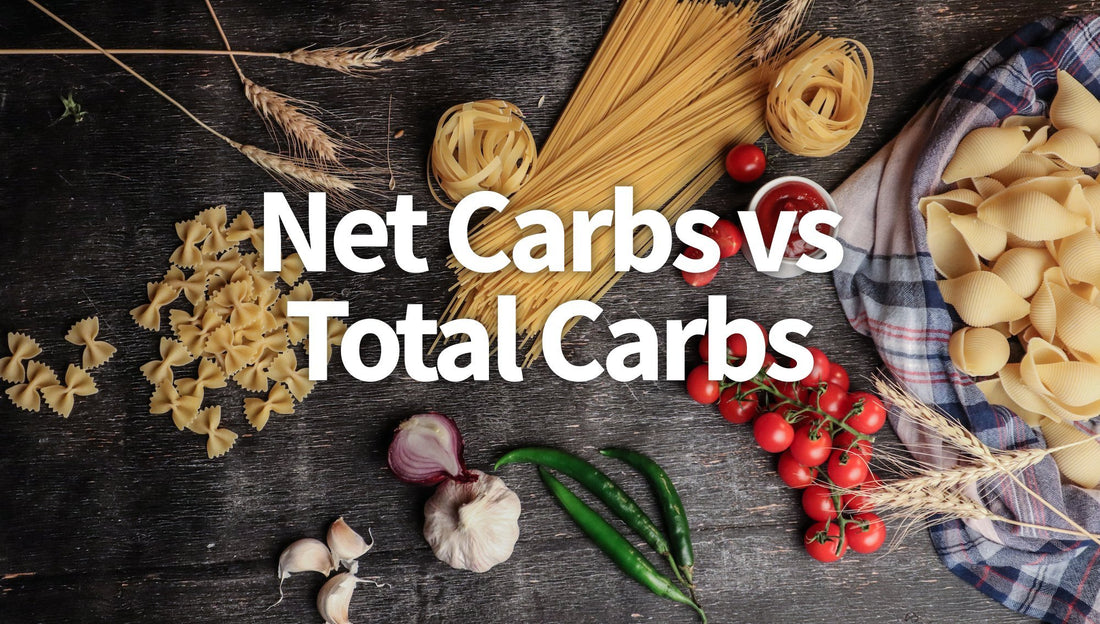
The Truth About Net Carbs vs. Total Carbs
Aria PalcichShare
Watching your carb intake may be second nature to many of you by now, but if you’re new to eating keto you’ll probably start to hear words like carb count, macros, and net carbs thrown around a lot. Today, we’re going to go over net carbs vs. total carbs, and which you might want to focus on counting on your keto diet. If you haven’t read our post on keto and fiber, we recommend you read it now!
This post will cover:
- The difference between net and total carbs
- Which carbohydrates to focus on when tracking macros
- When to be cautious about net carbs
- How to starting tracking your carb macros
Counting Macros
Before we get started, lets discuss why we’re talking about counting carbs. When you switch to eating a ketogenic diet, you will need to keep your macronutrients, aka ‘macros’ within a certain range. Macros are just a fancy word for the three nutrients the human body needs in the largest quantity. The three macronutrients are protein, fat and carbohydrates (carbs). On a ketogenic diet, you’re getting about 70-80% of your calories from fat, 20-25% from protein, and 5-10% from carbs. This is why there is a large focus on tracking your carbohydrate intake. Coming from a standard diet you’re greatly reducing your carb intake, and unless you track, it can be easy to over eat this macronutrient in the beginning.
The Difference Between Net Carbs and Total Carbs
When reading a standard nutrition label, it is important to note the total carbohydrate count will include additional components that count towards the total carbohydrate number. In other words, the total carbohydrate number is referring to the carbs from all sources. Usually included on labels are sugar, fiber, and sometimes sugar alcohols. Taking the label below as an example, we can see the total carbohydrates equals 37 grams. You do not need to add fiber and total sugar to this, they are included in the total carbohydrate count.
Total carbohydrates: the total number of carbohydrates from all sources

When we talk about net carbs, we’re talking about everything included in that total number, minus the fiber. Put simply, net carbs = total carbs – fiber. Using the same label, we can see the total carbs are 37 grams, and the fiber is 4 grams. To get our net carb count we’re going to minus 4 from 37, giving us a net carb count of 33 grams. Note: the words dietary fiber and fiber are used interchangeably.
Net carbohydrates: the total carbohydrates minus the fiber
Which carbohydrates do you focus on when tracking macros?
Fibre:
As we discussed in our previous blog post, fiber is the portion of carbohydrates found in plants that passes through your body undigested. In other words, fiber is not absorbed by the body, and generally does not impact blood sugar like other carbohydrates. Net carbs are the carbs left over that will be absorbed by the body. While we do know that insoluble fiber leaves the body completely undigested, the role of soluble fiber in the body is a little more complicated. Soluble fiber may be partially digested and doesn’t necessarily have zero impact on blood sugar.
Sugar:
On a nutrition label, sugar also falls under the category of carbohydrates. This number will include both added sugar and sugars found naturally in foods. So a food with a number other than zero isn’t automatically banned from a keto diet, it just depends where the sugar is coming from. Avoiding all adding sugar is recommended, but natural sugars found in foods will not be. Even cauliflower has natural sugars! Reading the ingredient list if you’re buying pre-packaged food will be a habit to form now that you’re eating keto.
Sugar Alcohols:
Sugar alcohols include xylitol and erythritol. They are derived from plant sources, and generally speaking do not impact blood sugar levels. Like fiber, they pass through the digestive track undigested, and therefore do not need to be counted toward your total carb count. There are some sugar alcohols that have been shown to increase blood sugar - Maltitol and sorbitol being two. If you see these listed, just know they may impact your blood sugar levels, although still not to the degree that real sugar would.
So which should you count? When eating a low-carb high-fat diet, we generally want to avoid all added sugar as a rule of thumb. After that, sticking to the net carb count will usually allow us to maintain nutritional ketosis and not go over our carb count. However if you're particularly carb sensitive, or eat a lot of high fiber foods, you may want to watch your total carb intake if you're not able to maintain ketosis.
Cautions
There are instances when net carbs may not be the best marker for counting carbs on a low-carb keto diet. In people with type 1 diabetes, fiber may still influence blood sugar, although the research is not conclusive. Those dealing with this condition may be better off counting total carbs.
Additionally, some processed foods labelled as low-carb or keto-friendly may also have an impact on blood sugar. This is because some companies add fiber into products in order to be able to decrease the total carb count. However, if these products contained ingredients that already raised blood sugar to begin with, adding fiber will not cancel the effect of the other ingredients.
Example: Let’s say you’re eating a protein bar with a total carb count of 20 grams and 15 grams of fiber. We can see here the net carb count of this bar would be 5 grams, not too shabby. However, let’s say one of the ingredients in this bar was dextrose, or even cane sugar juice. These ingredients are still pure sugar, and will raise blood sugar despite the bar having a high fiber count.
So, how to you avoid this? We recommend always reading the label, and looking at the ingredient list as well as the nutritional information. Unfortunately, on some products the net carb count can be misleading. Sticking to unprocessed whole foods can also be a good way to stay clear of this trap.
Tracking Carbohydrates
Although there is no one correct limit for carbohydrates, and sensitivity to carbs will vary from person to person, there are some general rules you can use as a starting point. When counting net carbs, usually sticking below 25 grams per day will be effective in achieving nutritional ketosis. If you’re counting total carbs, keeping your total to around 50 grams or less will be a good place to start.
Ultimately, it is up to the individual to determine his or her own carb tolerance. There is no short cut, but rather trial and error can be used find your own sweet spot. If you do plan to count carbs, there are some great tools like carb manager and my fitness pal that can help you get started. We’ve add all our Ketolibriyum products to these apps to make tracking our food easy and hassle free! Additionally, those focused on eating low-carb high-fat rather than strict keto will have more flexibility with the number.
To read about how alcohol affects your keto diet click here.
